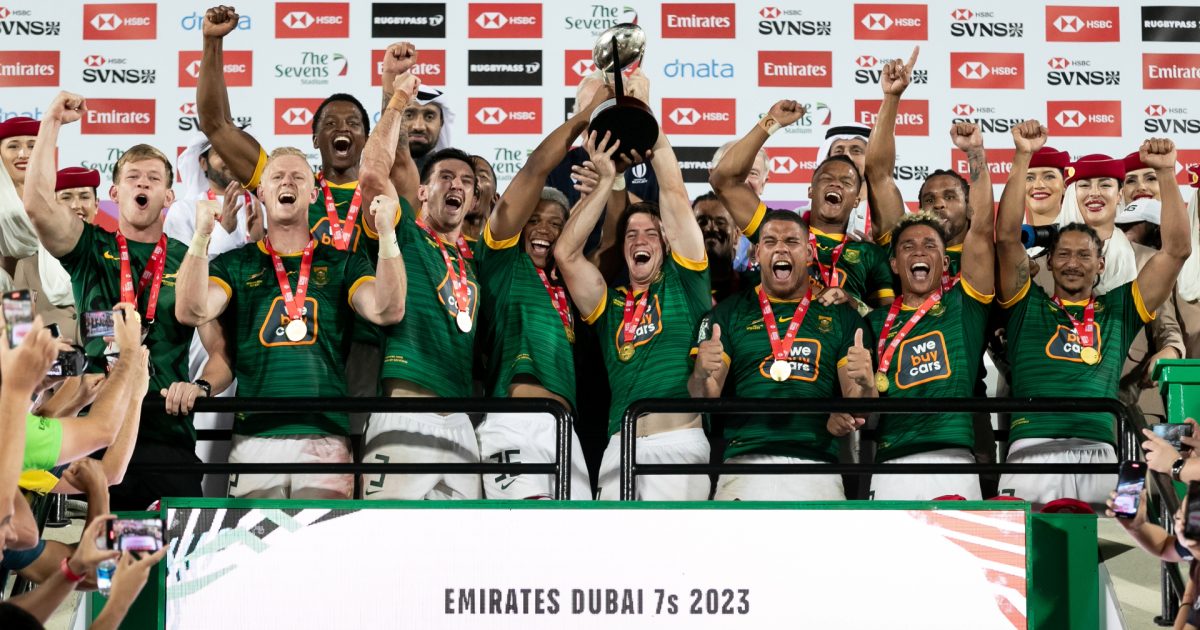How Springboks’ World Cup success has raised the bar for Blitzboks

When Springboks captain Siya Kolisi lifted the Webb Ellis Cup in triumph for the second time at as many Rugby World Cups, rugby-mad South Africa rejoiced as one.
For a country with a history of division, disruption and discrimination, the Springboks’ success at rugby’s showpiece event has become a vessel for unity within the Rainbow Nation.
President Nelson Mandela famously presented captain Francois Pienaar with the World Cup trophy at Johannesburg’s Ellis Park in 1995 – it might be the most iconic moment in rugby’s esteemed history.
Springboks fans had to wait a while for another World Cup title, but captain John Smit and the rest of the 2007 champion squad can rightfully take their place among the legends of rugby union.
But there’s something unique about the current crop of world champions. South Africa became the second nation to go back-to-back when captain Kolisi led the Springboks to World Cup glory in October.
Fans fortunate enough to be at Stade de France on that fateful Parisian night witnessed history, but the magnitude of the achievement became apparent when the Springboks returned home.
Thousands mobbed the streets in various cities around the nation as they joined in on the World Cup celebrations along with their rugby heroes. The Springboks are more than just rugby players.
The Springboks’ transformative success has raised the bar for other athletes who aim to represent the nation on the rugby field with honour, pride and humility – and they know it.
After helping the Blitzboks win the Dubai SVNS for the eighth time in 10 tournaments, Sevens great Rosko Specman explained how the Springboks’ success is motivating the team on the new-look SVNS Series.
“It is very special. It’s a great turnaround for the guys because last season we weren’t on par, there were a lot of youngsters and you could see the youngsters have improved,” Rosko told RugbyPass on the field at Dubai’s The Sevens Stadium.
“The guys are sticking to the system now and they work for each other, as you saw today, when the guys break the line the guys are chasing. They’re working for one and not as individuals.
“It’s something happening now in the team.
“As you saw this year, the Springboks won the World Cup back-to-back and that is the drive that we have now. We also want to be number one in the world again.”
With probably the most supporters out of any team in Dubai behind them, South Africa took the field last weekend with a bit of a point to prove.
The Blitzboks had beaten Ireland in the Cup final a year earlier, and with that comes pressure – but the sense of belief and almost the expectation of success was far more desperate after last season.
South Africa stalled during the rest of the 2022/23 season as they fell to an uncharacteristically poor seventh-placed finish on the circuit. Up until this point, they still haven’t qualified for the Olympics either.
But nothing else mattered to this team last weekend other than the Dubai SVNS. It presented the Blitzboks with an opportunity to redeem themselves on the world stage, and they made the most of it.
“We know if we stick to our structure that we can be there on top of the world because we were there before, it’s just hard to get back there again,” Specman added.
“The results are there but you know what’s the nicest thing? Next week we must start all over again and try to be on top again.
“It’s never an easy task for this team and we try to make sure we fight every day because next week, if we don’t pitch up, we cannot play finals and that’s our home tournament.
“Tonight we will enjoy this time and when we get on the plane we’ll just go back to zero, start all over again, and fight again because now we’re playing in front of our home crowd.
“It’s a lot of pressure and this team can get energy from pressure.”
Following a five-year stint in 15s, Rosko Specman returned to the SVNS Series last weekend in what proved to be a major boost to a talented side with plenty to prove.
Specman, 34, won a bronze medal at the 2016 Olympics in Rio de Janeiro and has also played a Test match for the Springboks. That’s experience that can’t be bought.
The SVNS great seemed to fit back into the Blitzboks’ squad with relative ease during the Dubai SVNS, and Specman will undoubtedly continue to play a big role ahead of the Cape Town leg.
“It’s really great to be back, the guys welcomed me back with open arms,” he said.
“For some of the guys I’m almost 15 years older than them so I think that has also given me the drive to give my everything every day on the training field.
“You don’t have a guarantee in this team and that’s the fighting spirit that I have. While me knees are still strong I will keep going.”
























































































